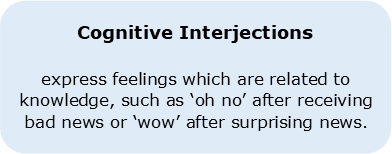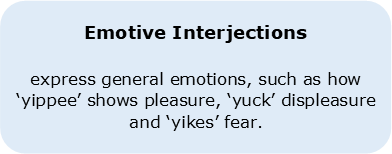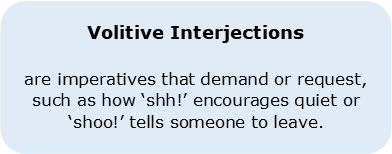Are interjections appropriate in academic writing?

This is the first of two chapters about Interjections. To complete this reader, read each chapter carefully and then unlock and complete our materials to check your understanding.
– Review the major word types such as nouns and verbs
– Discuss what makes interjections a unique word type
– Explore the three subtypes of interjection: cognitive, emotive and volitive interjections
Chapter 1

Of all the word types in English, none is stranger than the interjection. Words such as ‘oops’, ‘boo’ and ‘whoa’ function like no other type of word in the language, and as such are grouped together based on their shared ability to express spontaneous reactions or feelings. In this short two-chapter reader on interjections, we answer in Chapter 1 the question of whether it’s OK to use words such as these in formal settings like academic essays and explore in Chapter 2 their grammar rules.
What are the major word types?
As in all languages around the world, English words can be categorised into various types through the analysis of shared patterns of form, function and distribution. Before studying interjections as a unified class of words, first study the academic examples below of each of the more common word types:
Adjectives: absolute, basic, competitive, distinct, effective, fundamental, ideal, permanent
Adverbs: accurately, consequently, furthermore, however, inevitably, similarly, successfully
Conjunctions: although, and, as, because, even though, but, that, whether, while
Determiners: a, an, any, every, few, some, the, that, this, those
Nouns: achievement, criticism, experiment, hypothesis, knowledge, majority, percentage
Prepositions: above, below, between, in, over, under
Pronouns: anyone, everything, it, that, this, which, whoever, whom
Verbs: achieve, benefit, conduct, demonstrate, examine, facilitate, highlight, investigate
What makes interjections unique?
So what do words such as ‘bravo’, ‘hurray’ and ‘phew’ have in common that groups them together under the classification of interjection? Firstly, unlike all other word types, interjections relate to the expression of feelings rather than to the expression of concepts or ideas. These feelings can be subclassified in three ways:



What additionally makes interjections unique is that:
- they can form complete sentences alone (‘Shh!’ and ‘Wow!’ are grammatical sentences according to most grammarians)
- they are dependent upon the context in which they are used (it would be impossible to know what ‘shh’ or ‘wow’ refer to without knowing their surrounding expressions)
- they cannot often be modified or inflected (‘shh’ and ‘wow’ will always be spelled the same)
- they do not provide grammatical function within a sentence (their function is semantic rather than grammatical, adding meaning to an expression).

Can I use interjections in formal writing?
While interjections might be interesting and fun, they’re not always useful. Academic language is famously objective, scientific, unambiguous and direct, and interjections such as ‘boo’ or ‘eek’ simply are not. Emotive words are inappropriate in academic discourse and would lower your marks in an assignment if included. For these reasons, students should remember that interjections are one word type that should never used in academic essays. Instead, you can call upon these words when chatting informally with your friends (or even to your university lecturer) and perhaps creatively as part of character dialogue within a novel or script.
Which interjections are most common in English?
To help students use interjections, we’ve identified and listed the most common examples below, dividing them into the three previously mentioned categories to assist with meaning. To use these words correctly however, we recommend that you research their specific meanings online with a dictionary such as Cambridge or Oxford and practise using them in authentic situations:
Cognitive Interjections
alas, bingo, bravo, crikey, duh, eh, eureka, gah, haha, hallelujah, hmm, oh dear, phew, right-o, shoot, thanks, uh-huh, uh-oh, zing
Emotive Interjections
aww, bah, brr, dang, eww, grr, gosh, holy cow, humph, hooray, jeepers, jeez, oh my, oh well, oops, ugh, whoa, whoopee, wow, yahoo, yeah, yikes, yippee, yuck
Volitive Interjections
ahem, boo, cheers, congrats, cheerio, please, psst, shh, shoo, yo

Great work on finishing this first chapter in our reader on interjections. To learn about the seven grammar rules that create accurate interjection use, continue reading with Chapter 2. And don’t forget to unlock, download and complete our Chapter 1 Worksheet too to check your progress and improve English proficiency.
Downloadables
Once you’ve completed both chapters in this short reader about Interjections, you might then wish to download our Chapter Worksheets to check your progress or print for your students. These professional PDF worksheets can be easily accessed for only a few Academic Marks.
Chapter 1 explores the topic: Are interjections appropriate in academic writing? Our Chapter 1 Worksheet (containing guidance, activities and answer keys) can be accessed here at the click of a button.
Chapter 2 explores the topic: Do interjections have 7 grammar rules in English? Our Chapter 2 Worksheet (containing guidance, activities and answer keys) can be accessed here at the click of a button.
To save yourself 1 Marks, click on the button below to gain unlimited access to all of our Interjections Chapter Worksheets. This All-in-1 Pack includes every chapter, activity and answer key related to this topic in one handy and professional PDF.
Collect Academic Marks
-
100 Marks for joining
-
25 Marks for daily e-learning
-
100-200 for feedback/testimonials
-
100-500 for referring your colleages/friends